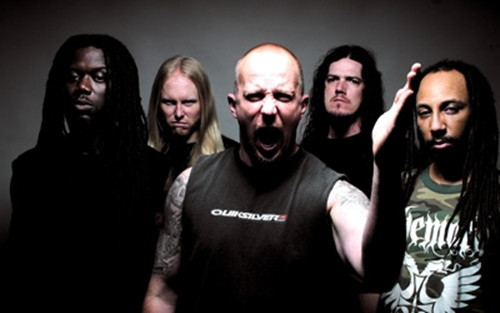(This is the first part of a two-part post by Andy Synn. Part 2 will be delivered to your doorstep tomorrow.)
Technique. Technicality. Technical skill and flair. However you describe it, it’s one of metal’s most defining traits when compared with the majority of other genres. After all, it takes a level of commitment (and, often, underlying talent) to achieve even a general level of proficiency, let alone a mastery, of metal’s traditional instruments.
As both skills and equipment have developed over the years, we’ve seen an increasing focus being placed on the technicality and complexity of metal across almost all its sub-genres (and, of course, a resultant reactionary backlash as well). The drums have gotten faster, the rhythms have gotten more poly-rhythmic, the guitars have gotten more note-crazy, and the time-signatures have gotten more algebraic – sometimes all within the same song!
Understandably, there have been those who’ve said that this focus on relentless technique and flashy playing often comes at the expense of good songwriting, and in many cases you’d be hard-pressed to contradict this assertion. But still, painting things as if they’re simply black and white is a mistake neither side in the pro-/con- technical debate should be making.
 Technical Death Metal will, most likely, be the most familiar form of “technical” metal to our readership. Heck, even within that sub-genre you can find a multitude of different forms and approaches to the sound, from the old-school originators (Suffocation, Cryptopsy, Nile) to the new school brutalisers (Necrophagist, Spawn of Possession, Lecherous Nocturne) to the proggy weirdos (Obscura, Decrepit Birth, The Faceless). And the list goes on.
Technical Death Metal will, most likely, be the most familiar form of “technical” metal to our readership. Heck, even within that sub-genre you can find a multitude of different forms and approaches to the sound, from the old-school originators (Suffocation, Cryptopsy, Nile) to the new school brutalisers (Necrophagist, Spawn of Possession, Lecherous Nocturne) to the proggy weirdos (Obscura, Decrepit Birth, The Faceless). And the list goes on.
What’s perhaps more interesting, though, is the divide between “Tech-Death” and “Technical Death Metal”. I’ve often thought that the way a genre label is constructed and applied reflects the music in a way many people don’t really think about. Consider this – although there’s undoubtedly some cross-over, a “Tech-Death” band is not a “Technical Death Metal” band. Confused?
Well, by that I mean that a “Technical Death Metal” band is generally a “Death Metal” band whose increased focus on technicality helps set them apart from the “Brutal” or “Old School” (and other) varieties, but who still have that central “Death Metal” core. Indeed by retaining the “Death Metal” aspect, they’re actually capable of being a lot more varied in their style and form.
By contrast, “Tech-Death” is most often used to refer to a distinct sub-sub-genre with some tighter constraints on its sound. Although the term is occasionally (negatively and/or incorrectly) conflated with “Deathcore”, I think it’s accurate to say that the genre limitations of “Tech-Death” refer to a much more specific and tightly prescribed sound. Whereas “Technical Death Metal” is a (relatively) wide term, “Tech-Death” is a much smaller box within this framework.
 To make it even clearer, think about the terms “Melodic Death Metal” and its similar antecedent “Melodeath”. Just as in the previous case, a “Melodic Death Metal” band is not a “Melodeath” band, even though the latter is undeniably a permutation of the former!
To make it even clearer, think about the terms “Melodic Death Metal” and its similar antecedent “Melodeath”. Just as in the previous case, a “Melodic Death Metal” band is not a “Melodeath” band, even though the latter is undeniably a permutation of the former!
Think of it in terms of taxonomy: “Music” is the Domain, “Metal” is the Kingdom, “Death Metal” is the Phylum, “Technical Death Metal” is the Class, “Tech-Death” is the Order… and so on. The further down the chain you go, and the more you modify the initial descriptors, the more specific and tightly constrained the sound/identity of the music becomes.
If you think about it this way it actually clears up a lot of the confusions and problems with genre names, and also lets you look at the “Tech” issues with a fresher perspective. It’s not a blight on the scene, or the coming of a new world order, it’s just another expression of an ever-evolving genome. “Technical”, “Melodic”, “Brutal”, “Progressive”… they’re all just different forms. And, like anything else, it’s the fittest who survive. And – in this music we call metal – it’s often song-writing which comes up trumps. Along with a bit of personal taste. After all, I’d take Beneath The Massacre over Brain Drill any day, but both have their charm…


I got nothing profound to add except, yeah, I agree, that makes sense 🙂
Technique always has to serve the music, not the other way around, and that can certainly be a problem in genres other than metal. I play classical guitar, and it comes up all the time in that community. The most famous classical guitarists are often (but not always) those who can play the fastest, not the ones who play the most musically. Classical guitarists will crank up the tempo marked by a composer by 20 beats per minute or more, just to show off, but all of a sudden, you’re listening to a power drill instead of a guitarist playing an actual song. A haunting melody is suddenly reduced to a hummingbird having a seizure.
I’ve long called it the Berklee College of Music Disease. Having lived in NYC and Boston for most of my life, I’ve had a decent number of guitar teachers who graduated from there. They are undeniably masters of technique and music theory–they know their stuff COLD. But sadly, many of them couldn’t compose a memorable piece of music to save their lives because they’re dedicated to jamming as many notes as possible into whatever they play.
Granted, I think I’m biased because during my formative years in the 80s, Eddie Van Halen was first becoming huge, so all the guitar mags were plastered with dudes (and their tablature) that subscribed to the All-Sweep-Picking-All-Tapping-All-the-Time school of thought, with melody nowhere to be found.
Very interesting. In a perverse way, it’s nice to see that metal isn’t the only music genre where exhibitions of acrobatic technique sometimes become the whole point of the music. I have to admit that I often enjoy listening to bands who’s main attraction is jaw-dropping speed and technicality, but I also rarely go back to such songs after hearing them once.
I love classical guitar, by the way, but it’s been years since I spent much time listening seriously. Even when I was into it, I didn’t explore much beyond the big names (Segovia, Bream, Parkening, John Williams). But the record that popped into my head first as I was writing this was a recording of “Concierto de Aranjuez” and “Fantasia para un Gentilhombre” with Ángel Romero as the guitar soloist. Can’t remember which orchestra that was. I wore that record out.
“Concierto de Aranjuez” has always been a favorite, di Meola / de Lucia / McLaughlin’s “Friday Night in San Fransisco” album is also quite enjoyable if you’re into that kinda of stuff. (if you’re unfamiliar here is the first song … video quality isn’t great but audiio is fine).
http://www.youtube.com/watch?v=nlaCZ106b5w
I have never heard someone make a distinction between technical death metal and techdeath (or melodeath and melodic death metal for that matter). In a world where we have a thousand different unnecessary sub-genres, this seems like a completely arbitrary distinction that would basically come down to “Bands I like are technical death metal..and bands I dont are techdeath”
I agree with this. I have heard people make a distinction between melodic death metal and melodeath, but not so much technical death metal and tech-death. While I do sort of understand what someone means when they separate those terms, I find that saying “melodeath” often means “melodic death metal that is too wussy so I don’t like it”.
I mean, there are a lot, lot, lot of micro-genres in metal and honestly I don’t mind that. But not every band that’s in the same genre has to sound exactly alike. Some technical death metal bands are just more noodly than others, and it’s okay to leave it at that.
I look forward to part 2, for once sub-genres seem useful instead of being much like a disease.
Unfortunately part 2 is much more negative, and addresses some creeping trends which I have observed.
It’s probably going to rile people up a lot more than this one.
I definitely felt that the genetic classification thing was a nice metaphor for genres/sub-genres though.
ooh…Im getting my pitchfork and torch ready as we speak
I’ll take Beneath The Massacre AND Brain Drill thanks. It’s all good to me.
What bands would you class as tech-death?? Really interested in this.
Probably because of my ignorance of the genre – I’m a black metal guy, but I used to dig Necrophagist, Decrepit Birth, and Nile (whom I always mentally-pigeonholed as brutal DM) back in the day – I always thought tech-death was just a contraction, and used it as such. Have I been mislabelling bands for years?
also, being a biochemist who’s *just* got home from the lab and cracked open his first beer of the evening, the biology reference was very much appreciated.
No no, I’m not claiming anyone’s been “mislabelling” things or trying to prove people wrong (and clearly some people have taken some offence to some of my assertions), I just find it interesting that there definitely are people who – at least on an instinctive level – do see a separation between “Tech Death” and “Technical Death Metal”.
If you want some examples I would describe Gorod and Beneath The Massacre as “Tech Death”, whereas unlike Islander below I would still consider Spawn Of Possession as “Technical Death Metal”.
Wait. Unlike me? I didn’t ascribe to any distinction between Technical Death Metal and Tech-Death, and I do consider Spawn a technical death metal band (lowercase, because I’m not picking between your two labels since I thought they were essentially the same). Without messing with labels, I was just pointing out that Spawn’s music is a certain kind of technical death metal while bands like Suffo, Necrophagist, Gorod, or Obscura are different kinds. I don’t have any thoughts about how any of these bands ought to be labeled within the technical death metal genre.
Too late man…youre a genre nazi now…its been established
I think the way Metal-Archives does it works pretty well. Obscura is labeled “Progressive/Technical Death Metal”; Nile, Suffocation and Cryptopsy are “Technical Brutal Death Metal”; Arsis is “Technical Melodic Death Metal”; and many more are just “Technical Death Metal.”
Of course, we can all argue over which bands should fall under those tags, but I think the tags themselves work pretty well.
I actually think picking apart the elements and trends in musical sub-genres is lots of fun, even if doing so can’t help but grow pedantic in time. So, I welcome the concept of this piece.
However, I don’t think this article on its own is very helpful at all. Like SurgicalBrute and Kazz, I’ve always used “tech-death” as a shorthand for “technical death metal”. There is no distinction between the two in my mind, so I was fascinated to see where you draw that line … and then you didn’t draw it. Maybe that’s in Part 2?
“Well, by that I mean that a “Technical Death Metal” band is generally a “Death Metal” band whose increased focus on technicality helps set them apart from the “Brutal” or “Old School” (and other) varieties, but who still have that central “Death Metal” core. Indeed by retaining the “Death Metal” aspect, they’re actually capable of being a lot more varied in their style and form.”
Okay, so here you do provide a basis for what you mean. Technical death metal bands incorporate traditional death metal elements with an emphasis on technicality in the playing and sound. I think it’d be best to list the specific musical elements you’re referring to as opposed to referencing other genres which themselves might not be clearly defined, but hey, it’s a metal blog. It’s fair to expect the reader to be an enthusiast and have some knowledge of the subject, especially a reader of NCS.
But then there’s this:
“By contrast, “Tech-Death” is most often used to refer to a distinct sub-sub-genre with some tighter constraints on its sound.”
Like what? That question is not entirely hypothetical, either. I can tell Death from Black from Power, but I really don’t know the distinction you’re trying to make here.
“Although the term is occasionally (negatively and/or incorrectly) conflated with “Deathcore”, I think it’s accurate to say that the genre limitations of “Tech-Death” refer to a much more specific and tightly prescribed sound.”
Which is defined by what?
“Whereas “Technical Death Metal” is a (relatively) wide term, “Tech-Death” is a much smaller box within this framework.”
Again, defined by what? What is that framework, and how does it differ from the broader Technical Death Metal sound?
Again, I like the direction of the article, I just think it’s missing the evidence to support the argument. We’re taking your word that “tech-death” is a more narrow, defined interpretation of “technical death metal”, but what does that actually sound like?
The thing is it’s an observation, not an argument. I tend to see people refer to certain bands as “Tech-Death” that they wouldn’t refer to as “Technical Death Metal” because they’re similar, but distinct, from established “Technical Death Metal” bands.
I actually like the idea of a Linnaean system for classification, but I can see it would lead to lots of arguments about where a band fits. I too have always thought of Tech-death as different than technical death metal, although I couldn’t say where that comes from – just the formation of a classification in my head, where the former would have bands like Spawn of Possession, Obscura, but technical death metal would be just … ahh, more technical than straight death?
I can also see why there’s a backlash against having so many sub-genres, but metal is such a diverse genre in itself that I see no way around it.
I can’t say I’ve ever thought about there being any difference between Technical Death Metal and Tech-Death as genre terms. I always just assumed the latter was a shorthand version of the former. But it seems very clear that whichever phrase is used, that broad sub-genre includes a lot of bands who are very different from each other.
There are differences in the extent to which bands incorporate melody into the music as opposed to being more atonal and percussive (eg, think of Suffocation or Necrophagist on one end of that spectrum and Gorod or Obscura closer to the other end). Some tend to be more acrobatic and even experimental, while maintaining high speed (I’m thinking of Spawn of Possession and Deeds of Flesh as examples), while others follow more conventional song structures.
I’m sure there are other characteristics and variations that could be identified, as a way of grouping bands within Technical Death Metal into more discrete categories. I’m not necessarily suggesting that it would be useful to come up with new micro-genre labels, but I think it’s clear that TDM covers a very broad swathe of music.
Basically I just thought this was an interesting little facet of our wonderously broad metal culture.
I’m not always trying to “prove” something y’see.
i do tend to lean towards “technical” metal more often than not, but a great song is a great song regardless of how complex or simple the fretwork.
Whenever I’ve seen any band labeled as melodeath, I simply assume the term is synonymous with melodic death metal. Given this, you would think I would associate tech-death with technical death metal in a similar manner. However, I find I am more apt to readily dismiss a band I am unfamiliar with if they are labeled as tech-death as opposed to one labeled as technical death metal. It is possible that I have fallen victim to the conflation of the terms tech-death and deathcore mentioned in the article, though I couldn’t exactly say why.